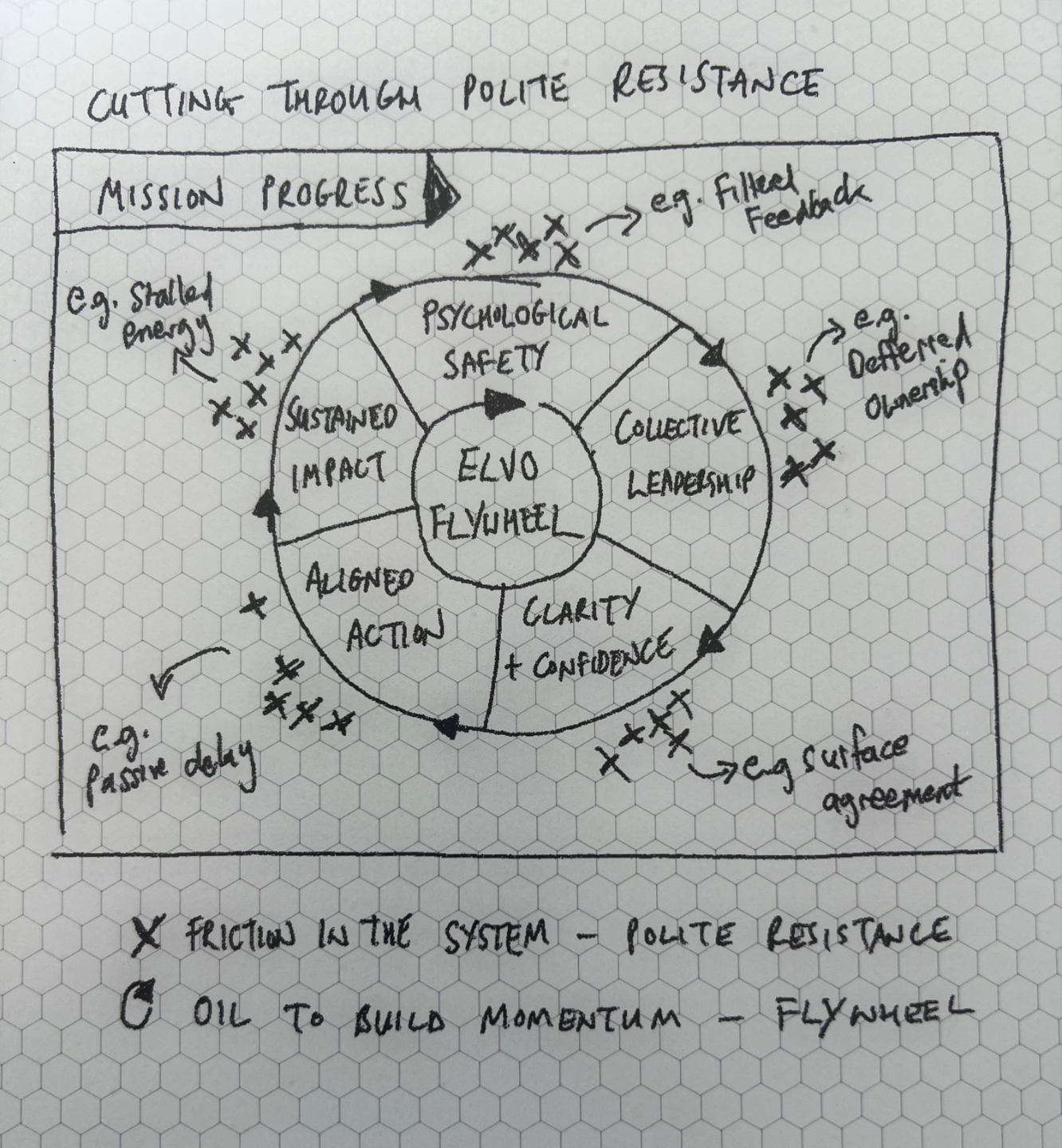Cutting Through Polite Resistance
A framework for leaders to reduce hidden friction, create safer teams, and deliver better outcomes for communities.
The Hidden Friction
It’s not sabotage.
It’s not open defiance.
It’s the quiet drag that creeps in when people appear to agree - but aren’t truly aligned.
This is polite resistance: one of the most common, yet least named, blockers to progress in high-pressure organisations.
You’ve probably seen it: nods in the meeting room, but hesitation, delay, or ambiguity in the work that follows. It’s not loud, but it slows momentum, drains energy, and over time, erodes trust.
I’ve seen it first-hand. In the Royal Air Force, it showed up when teams respected authority but didn’t fully believe in the plan. Outwardly, they complied. But the energy wasn’t there, and missions stalled.
In local government, I see it when skilled, values-driven professionals disengage from top-down change. Not because they don’t care, but because they don’t feel heard - or safe enough to challenge.
The outward signal is “yes.” But the behaviour says otherwise.
Why Polite Resistance Matters
Most people don’t want to resist. They want to contribute, to do meaningful work without friction.
But when expectations are unclear, when challenge feels unsafe, or when trust in direction falters, people protect themselves. Not with open protest, but with delay, caution, and filtered engagement.
The research backs this up.
-
Amy Edmondson’s work on psychological safety shows that when people don’t feel safe to speak up, they withhold concerns - and performance suffers.
-
Chris Argyris’s theory of organisational defences highlights how teams often avoid real conflict, creating a culture of “politeness” that masks real issues.
-
John Kotter’s change research identifies lack of alignment and unclear urgency as key reasons change efforts fail.
Left unaddressed, polite resistance quietly erodes:
-
Momentum — projects stall even when “in progress.”
-
Trust — people withdraw instead of speaking up.
-
Engagement — energy drains into quiet disengagement.
-
Clarity — roles blur and decisions drift.
For leaders, it creates a frustrating mismatch: conversations feel positive, but the results don’t follow through.
Measuring Polite Resistance
To help leaders see what’s really going on, I created the Polite Resistance Index (PRI). It breaks this hidden friction into five measurable categories:
-
Follow Through — when agreement doesn’t translate into action.
-
Challenge & Disagreement — when people hold back from speaking truth.
-
Emotional Tone — when caution or tension quietly drain energy.
-
Direction & Priorities — when clarity is missing and decisions drift.
-
Team Momentum — when energy stalls and progress feels heavy.
These categories make polite resistance visible, giving leaders a baseline for reflection and action.
But measurement is only the first step. Leaders also need a way to build alignment and reduce resistance in practice. That’s where the Flywheel comes in.
The ELVO Flywheel: A Framework for Alignment
To cut through polite resistance, leaders need more than authority - they need alignment. Alignment reduces friction, restores momentum, and makes work feel lighter, more purposeful, and more human.
The ELVO Flywheel™ is a simple, human-centred leadership framework. Think of it as oil for the system: reducing the grit that slows things down, while restoring trust and flow.
It has five connected parts. Progress in one naturally fuels progress in the next:
-
Psychological Safety — Removes fear and filters so people can speak honestly. (Edmondson’s research shows teams with safety innovate more and make fewer errors.)
-
Collective Leadership — Breaks silent deference so ownership is shared. (Argyris reminds us that defences shrink when responsibility is distributed.)
-
Clarity & Confidence — Replaces second-guessing with shared direction. (Kotter stresses the power of a clear, compelling vision for mobilising action.)
-
Aligned Action — Turns talk into traction. When direction is trusted, follow-through becomes the norm.
-
Sustained Impact — Habits and rhythms protect progress so momentum endures, even under strain.
When these five forces are in motion, resistance no longer festers. Instead, concerns surface early, are handled constructively, and energy flows forward.

When Resistance is a Signal
Not all resistance is bad. Sometimes hesitation is a valuable early warning - about resourcing, feasibility, or unintended consequences.
The goal isn’t to crush resistance. It’s to create conditions where people can voice concerns openly, test them constructively, and act with transparency.
That’s what separates healthy challenge from the hidden drag of polite resistance.
Why This Matters for Leaders Today
Polite resistance is rarely named - but once leaders see it, they recognise it everywhere.
It explains why projects that looked aligned on paper stall in practice. It explains the fatigue leaders feel when the energy in the room doesn’t translate into momentum outside it.
And most importantly, it points to a way forward.
The PRI makes the hidden friction visible. The Flywheel provides a framework for addressing it. Together, they give leaders practical tools to reduce resistance, build alignment, and unlock progress.
Because when teams move with trust and clarity, not only does performance improve — the work itself feels better. People feel lighter, more engaged, and more connected to the purpose they serve. And in the public sector, that translates into something bigger: better outcomes for communities.
Work in progress
I still work inside local government today, facing these same dynamics. I continue to work on my own leadership, reflecting on how polite resistance shows up in my teams and what I can adjust.
That’s why I built ELVO - not as theory from the outside, but as practical tools tested in the systems where I still serve.
Polite resistance may be subtle. But it doesn’t have to define your culture. With the right insight and frameworks, leaders can cut through the friction, rebuild momentum, and create environments where people can bring their best.
Richard
ELVO Founder
Polite resistance doesn’t have to hold your team back.
Discover your PRI, spark reflection, and take your first steps toward happier teams and better outcomes.

